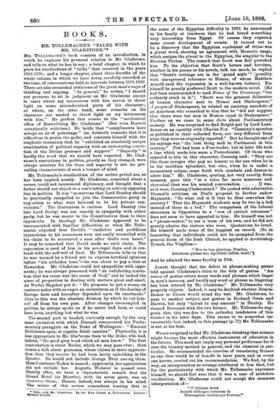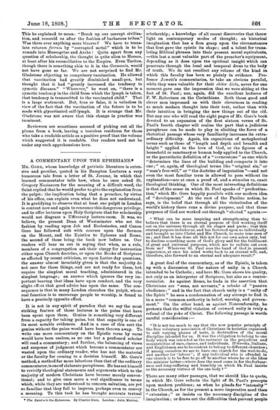BOOKS.
MR. TOLLEMACHE'S "TALKS WITH MR. GLADSTONE."*
Ma. TOLLEMACHE'S book consists of an introduction, in which he explains his personal relation to Mr. Gladstone, and tells us what he has to say; a brief chapter, in which he gives his recollections of " talks " that occurred in the years 1856.1870; and a longer chapter, about three-fourths of the whole volume, in which we have notes, carefully recorded at
the time, of conversations held at intervals between 1891-1896. There are also occasional criticisms of the great man's ways of thinking and arguing. "In general," be writes, "I should not presume to sit in judgment on Mr. Gladstone except in cases where my intercourse with him serves to throw light on some misunderstood parts of his character ; or where, on the other hand, some remarks on his character are needed to throw light on my intercourse with him." He prefers this course to the "mechanical office of Boswellising Mr. Gladstone." (But even Boswell occasionally criticises.) He holds that " compliments have always an air of patronage" (as Aristotle remarks that it is ridiculous to praise the gods), and contents himself with the emphatic encomium that he " exhibited an absolutely unique combination of political sagacity with an unwavering convic- tion of the Divine presence and support." " Sagacity " is hardly the word that we should have expected. Mr. Glad- stone's convictions in politics, greatly as they changed, were always absolute for the time, and sagacity is not the pre- vailing characteristic of such a temper of mind.
Mr. Tollemache's recollections of the earlier period are, as has been implied, scanty. Mr. Gladstone, consulted about a career, could not recommend diplomacy, and thought that a father should not object to a son's taking an actively opposing line in politics. It was " monstrous that Lord Stanley should be practically compelled to join the Conservative party in opposition to what were believed to be his private con- victions." The illustration is curious. Lord Stanley (the late Lord Derby) was not exactly in sympathy with either party, but he was nearer to the Conservatives than to their opponents. In theology Mr. Gladstone appeared to be unacquainted with familiar difficulties, as when Mr. Tolle- mache objected that David's " vindictive and perfidious injunctions to his successors were not easily reconciled with his claim to be accounted a man after God's own heart." It may be remarked that David made no such claim. The expression is used of him in his pre-regal days, and in con- trast with the self-will of Saul. Mr. Tollemache tells us that he was warned by a friend not to express heretical opinions before " his orthodox host,"—he was about to pay a visit at Hawarden. Mr. Gladstone could not sympathise with oppo- nents ; he was always possessed with "an unfaltering convic- tion that his cause was the cause of God," and he lacked the sense of proportion in dealing with matters great and small. As Walter Bagehot put it : " He proposes to put a stamp on contract notes with as eager an earnestness as if the destiny of Europe here and hereafter depended upon its enactment." Akin to this was the absolute division by which be cut him- ad! off from his own past. After changes unexampled in politics, he always spoke as if he never had been, or could have been, anything but what be was.
The second part is headed, curiously enough, by the very same quotation with which Disraeli ornamented his Parlia- mentary panegyric on the Duke of Wellington : " Emicuit Stilichonis apex, et cognita fulsit canities." Physically, it is less appropriate to Mr. Gladstone than to the Duke, who had, indeed, " the good grey head which all men knew." The first conversation is about Butler, which we may pass over ; then comes a talk about poetesses, whose claims to more apprecia- tion than they receive he had been lately upholding in the
Speaker. He would not include George Eliot among them. Miss Constance Naden is named ; apparently, her agnosticism did not exclude her. Augusta Webster is passed over. Shortly after, we have a characteristic remark that the Grand Hotel (at Biarritz), with its seven gates, was an irrieTtatot eioas. Homer, indeed, was always in his mind. The writer of this review remembers bearing that at • Talks wile Mr. Gladstone. By the lion. Lionel A. Tollemache. London : Ideread
the crisis of the Egyptian difficulty in Ian, he announced to his family at luncheon that he had heard something very interesting from Egypt. Of course they expected, some recent development of events. It turned out to.
be a discovery that the Egyptian equivalent of eciAtar was a plural word, showing an agreement with Homeric usage,. which assigns the plural to the Egyptian, the singular to the Boeotian Thebes. The remark that Scott was dull provoked him. To the objection that Scott's heroes and heroines,.
whether in his poems or his novels, talk too much, be replied that " Scott's writings are in the grand style" (possibly with unexpressed reference to Homer, of whom Matthews Arnold used the expression in a well-known lecture), For himself he greatly preferred Scott to the modern novel. (He bad been recommended to read Diana of the Crossways, "but evidently stuck in it.") "Scott was the greatest delineator of human character next to Homer and Shakespeare."' A propos of Shakespeare, he related an amusing anecdote of an American who remarked to him that be "did not suppose that there were ten men in Boston equal to Shakespeare."' Further on we come to some dicta about Parliamentary oratory. He was surprised to find Bright put by Lord Lans- downe on an equality with Charles Fox. "Canning's speeches.
as published in their collected form, are very different from what they were as originally reported." Bnt he thought one of his sayings was " the best thing said in Parliament in this. century." Pitt had been a Free-trader, but in later life took a line which made him seem a Protectionist. Of those who. appealed to him in this character, Canning said : "They are-
like those savages who pay no honour to the sun when he is, in his meridian splendour, but who, when he is under a.
momentary eclipse, come forth with cymbals and dances to. adore him." Mr. Gladstone, quoting, not very exactly, from, memory, gave this " in a voice far more sonorous and-
rhetorical than was his wonted conversation It was,.
as it were, Canning Gladstonised." He quoted with admiration, Disraeli's criticism on Peel's proposal to farther endow. Maynooth " To what end is it that he thus convulses the country ? That the Maynooth students may lie two in a bed• instead of three in a bed." The comparison of the Liberal statesmen in Opposition to a "row of extinct volcanoes" does not seem to have appealed to him. He himself was not a " phrase-maker," to use a term of his own, and he did not greatly admire the orators who were. Quotations he loved.
He himself made some of the happiest on record. (So in lamenting that individuals could not be exempted from the general doom of the Irish Church, he applied to Archbishop. Trench, the Virgilian- "Nec to tua plurima, Panthu, labentem pietas nea Apollinis infula texit.") And he admired the same faculty in Pitt.
Jowett thought that the defect in phrase-making power- told against Gladstone's claim to the title of genius. "Am orator of genius utters many words and phrases which linger in men's memory, and hardly any word or phrase so lingering has been uttered by Mr. Gladstone." Mr. Tollemache very properly objects. Indeed, it may be doubted whether Demos- thenes or Cicero would stand the test. Mr. Gladstone, to. pass to another subject, saw genius in Richard Owen and. Darwin, but only "talent to any amount" in Huxley. He: classed Romanes with the two former. Mr. Tollemache sug- gests that this was due to the orthodox tendencies of this thinker in his later days. This seems to us somewhat un- reasonable, but, indeed, in this passage (p. 72) Mr. Tollemache.
is not at his beat.
We are surprised to find Mr. Gladstone thinking that science- might become the most effective instrument of education in the future. This need not imply any personal preference for it over the literary method in general, and the classical in par-. titular. He recommended the exercise of translating Horace as one that would be of benefit in later years, and as every one knows, carried out his recommendation. We find, by the- way, an interpretation so strange attributed to him that, hub for the particularity with which Mr. Tollemache expresses, himself, we should feel sure that it was a case of mistaken recollection. Mr. Gladstone could not accept the common
interpretation of- " 0 utinam nova incude diffingas retusum in Massagetas Arabasque ferrum."
This he explained to mean: "Break up our corrupt civilisa- tion, and remould us after the fashion of barbarous tribes." Was there ever anything more bizarre F We have to trans- late retusum ferrunt by "corrupted metal" which is to be remade into Massagetae and Arabs ! Quite apart from any question of scholarship, the thought is quite alien to Horace, at least after his reconciliation to the Empire. Even Tacitus, though there is something akin to it in the Germania, would not have gone so far. We are not surprised to find Mr. Gladstone objecting to compulsory vaccination. He allowed that vaccination had greatly diminibiled small-pox, but thought that it had "greatly increased the tendency to zymotic diseases." " Wherever," he went on, " there is a zymotic tendency in the child from which the lymph is taken, that tendency is transmitted to the vaccinated child." That is a large statement. But, true or false, it is valueless in view of the fact that the vaccination of the future is to be made with glycerinated calf-lymph. It is strange that Mr. Gladstone was not aware that this change in practice was imminent.
Reviewers are sometimes accused of picking out all the plums from a book, leaving a tasteless residuum for those who take a readable article as a positive proof that the volume which suggested it is readable. Our readers need not be under any such apprehensions here.



































 Previous page
Previous page